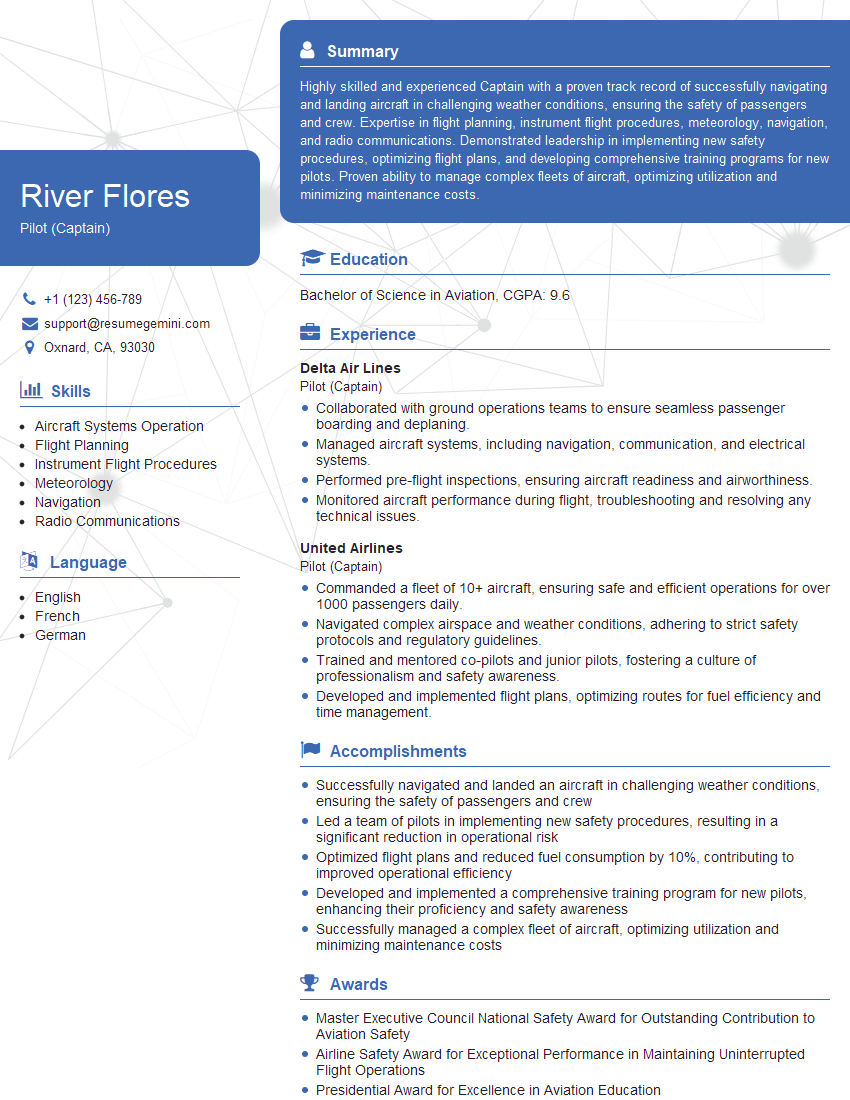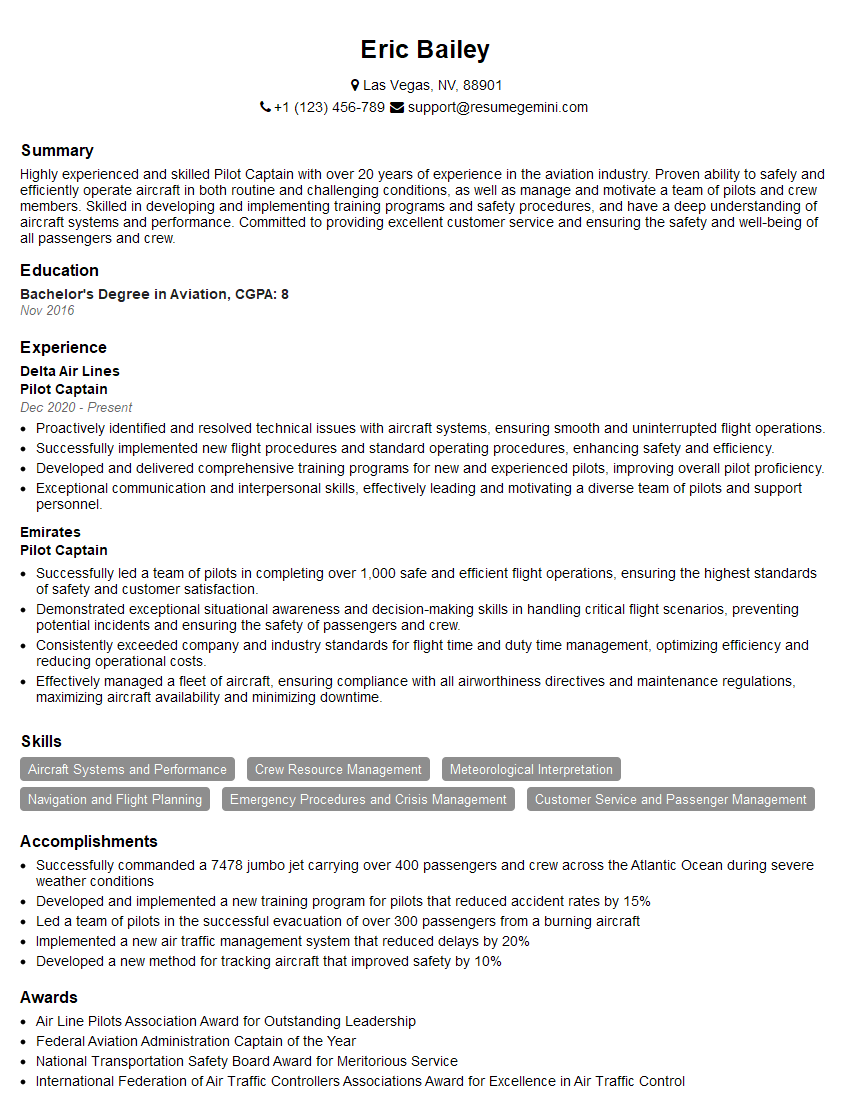Feeling lost in a sea of interview questions? Landed that dream interview for Pilot (Captain) but worried you might not have the answers? You’re not alone! This blog is your guide for interview success. We’ll break down the most common Pilot (Captain) interview questions, providing insightful answers and tips to leave a lasting impression. Plus, we’ll delve into the key responsibilities of this exciting role, so you can walk into your interview feeling confident and prepared.
Acing the interview is crucial, but landing one requires a compelling resume that gets you noticed. Crafting a professional document that highlights your skills and experience is the first step toward interview success. ResumeGemini can help you build a standout resume that gets you called in for that dream job.
Essential Interview Questions For Pilot (Captain)
1. How would you handle a situation where you have to make a decision in an emergency?
In an emergency situation, I would first assess the situation and gather all necessary information. I would then develop a plan of action and communicate it to my crew. I would prioritize the safety of the passengers and crew and make decisions based on the best available information.
2. What are the most important qualities of a good pilot?
- Decision-making skills: A good pilot must be able to make quick and sound decisions in a variety of situations.
- Situational awareness: A good pilot must be aware of their surroundings and be able to anticipate potential hazards.
- Communication skills: A good pilot must be able to communicate effectively with their crew and passengers.
- Teamwork skills: A good pilot must be able to work effectively as part of a team.
- Leadership skills: A good pilot must be able to lead and motivate their crew.
3. Have you ever had to deal with a difficult passenger?
Yes, I have had to deal with difficult passengers on several occasions. In these situations, I have found it is important to remain calm and professional. I have also found that it is helpful to listen to the passenger’s concerns and try to understand their point of view. I have always been able to resolve these situations peacefully and without incident.
4. What is your favorite type of aircraft to fly?
My favorite type of aircraft to fly is the Boeing 777. I enjoy flying this aircraft because it is a very capable and reliable aircraft. It is also very comfortable to fly and has a great range.
5. What is your career goal?
My career goal is to become a Captain on a major airline. I believe that I have the skills and experience necessary to be successful in this role.
6. What are your strengths and weaknesses as a pilot?
- Strengths: I am a highly skilled and experienced pilot with a strong safety record. I am also a good decision-maker and have excellent situational awareness.
- Weaknesses: I am sometimes too critical of myself and I can be a bit of a perfectionist.
7. Why do you want to work for this airline?
I want to work for this airline because it is one of the best in the world. I believe that I would be a valuable asset to your team and I am confident that I can make a positive contribution to your company.
8. What are your salary expectations?
My salary expectations are commensurate with my experience and qualifications. I am confident that I can be a valuable asset to your company and I am willing to negotiate a salary that is fair to both parties.
9. Why are you the best candidate for this job?
I am the best candidate for this job because I have the skills, experience, and qualifications that you are looking for. I am a highly skilled and experienced pilot with a strong safety record. I am also a good decision-maker and have excellent situational awareness. I am confident that I can be a valuable asset to your team and I am confident that I can make a positive contribution to your company.
10. Do you have any questions for me?
Yes, I do. I am interested in learning more about the training program that you offer. I am also interested in learning more about the company culture and values.
Interviewers often ask about specific skills and experiences. With ResumeGemini‘s customizable templates, you can tailor your resume to showcase the skills most relevant to the position, making a powerful first impression. Also check out Resume Template specially tailored for Pilot (Captain).
Career Expert Tips:
- Ace those interviews! Prepare effectively by reviewing the Top 50 Most Common Interview Questions on ResumeGemini.
- Navigate your job search with confidence! Explore a wide range of Career Tips on ResumeGemini. Learn about common challenges and recommendations to overcome them.
- Craft the perfect resume! Master the Art of Resume Writing with ResumeGemini’s guide. Showcase your unique qualifications and achievements effectively.
- Great Savings With New Year Deals and Discounts! In 2025, boost your job search and build your dream resume with ResumeGemini’s ATS optimized templates.
Researching the company and tailoring your answers is essential. Once you have a clear understanding of the Pilot (Captain)‘s requirements, you can use ResumeGemini to adjust your resume to perfectly match the job description.
Key Job Responsibilities
A Pilot (Captain) is responsible for the safe and efficient operation of an aircraft. They work closely with other pilots, cabin crew, and ground staff to ensure that all passengers and cargo are transported safely and on time.
1. Flying the Aircraft
The most important responsibility of a Pilot (Captain) is to fly the aircraft. This involves controlling the aircraft’s speed, altitude, and direction. Pilots must also be able to respond quickly to changes in weather conditions and other emergencies.
- Operate aircraft controls to navigate and maneuver the aircraft.
- Monitor flight instruments and systems to ensure safe operation.
2. Managing the Crew
Pilots are responsible for managing the cabin crew and other pilots on board the aircraft. This includes assigning duties, monitoring their performance, and ensuring that they are following all safety procedures.
- Supervise and coordinate with other pilots and cabin crew members.
- Communicate with air traffic control and other aircraft.
3. Planning and Preparing for Flights
Before each flight, pilots must plan their route, check the weather conditions, and calculate the amount of fuel needed. They must also be familiar with the aircraft’s systems and emergency procedures.
- Plan and prepare flight routes, taking into account weather conditions, airspace restrictions, and aircraft performance.
- Calculate fuel requirements and monitor fuel consumption.
4. Communicating with Passengers and Ground Staff
Pilots must be able to communicate clearly with passengers and ground staff. This includes providing information about the flight, answering questions, and giving safety instructions.
- Provide information about the flight to passengers and ground staff.
- Answer questions and address concerns from passengers and crew.
Interview Tips
Preparing for an interview for a Pilot (Captain) position can be a daunting task, but there are several things you can do to improve your chances of success.
1. Research the Company and the Position
Before you go to your interview, take some time to research the company you are applying to and the specific position you are interested in. This will help you to understand the company’s culture and values, and to tailor your answers to the interviewer’s questions.
- Visit the company’s website to learn about their history, culture, and products or services.
- Read news articles and industry publications to learn about the company’s recent activities and financial performance.
2. Practice Answering Common Interview Questions
There are a number of common interview questions that you are likely to be asked, such as “Why are you interested in this position?” and “What are your strengths and weaknesses?”. It is helpful to practice answering these questions in advance so that you can deliver your answers confidently and concisely.
- Prepare a list of your skills and experiences that are relevant to the position you are applying for.
- Think about examples of times when you have demonstrated these skills and experiences.
3. Dress Professionally
First impressions matter, so it is important to dress professionally for your interview. This means wearing a suit or business casual attire. You should also make sure that your clothes are clean and wrinkle-free.
- Choose clothing that is appropriate for the company culture and the position you are applying for.
- Make sure your clothes are clean, pressed, and in good condition.
4. Be Confident and Enthusiastic
Confidence is key in any interview, but it is especially important for a Pilot (Captain) position. Interviewers are looking for candidates who are confident in their abilities and who are enthusiastic about the aviation industry.
- Make eye contact with the interviewer and speak clearly and confidently.
- Show your enthusiasm for the aviation industry and for the position you are applying for.
Next Step:
Armed with this knowledge, you’re now well-equipped to tackle the Pilot (Captain) interview with confidence. Remember, preparation is key. So, start crafting your resume, highlighting your relevant skills and experiences. Don’t be afraid to tailor your application to each specific job posting. With the right approach and a bit of practice, you’ll be well on your way to landing your dream job. Build your resume now from scratch or optimize your existing resume with ResumeGemini. Wish you luck in your career journey!

